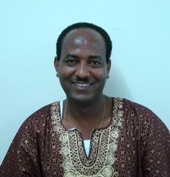 Mulu Atesbaha is not your typical fistula surgeon. He is not a medical doctor; rather, he is a health officer working on his master’s degree in public health. But thanks to the mentoring of Dr. Melaku Abraha, the seasoned gynecologist at the Mekelle Hamlin Fistula Center, Mulu is learning surgical skills to be able to transform the lives of women living with fistula.
Mulu Atesbaha is not your typical fistula surgeon. He is not a medical doctor; rather, he is a health officer working on his master’s degree in public health. But thanks to the mentoring of Dr. Melaku Abraha, the seasoned gynecologist at the Mekelle Hamlin Fistula Center, Mulu is learning surgical skills to be able to transform the lives of women living with fistula.
Mulu first encountered fistula when he was employed by the Ethiopian government, serving in the eastern Tigray region. He still remembers the first woman with fistula whom he referred. She had lived with her obstetric fistula for seven years, and surgical repair at Mekelle restored her completely. She is now working in her home village.
Seeing the transformation made possible by fistula repair, Mulu eagerly applied when he heard that there was a position open at the Mekelle Hamlin Fistula Center. Mulu got the job and learned more about how to diagnose women with urinary incontinence. He then learned a bit about anesthesiology, and he began to learn surgical skills by watching Dr. Abraha perform fistula repairs. Now, Mulu is skilled enough to perform simple repairs himself, with Dr. Abraha’s guidance. As Mulu hones his skills over time, he will increase the capacity of the Mekelle Hamlin Fistula Center to provide fistula repairs.
Given the complexities of fistula surgery, task shifting to nonphysicians is not typical. Task shifting for other procedures is becoming more common, however. The Ethiopian government is implementing a policy that allows health officers to specialize in emergency surgery like cesarean section. This is intended to improve the availability of emergency obstetric care in Ethiopia’s vast rural areas and prevent birth injuries like fistula. In practice, of course, the success of task shifting will depend on the skills, aptitude, and workload of the health worker, as well as the availability of a senior professional who can provide guidance and ensure safety.
Mulu is grateful to continue learning and serving in Mekelle. He says there is “great psychological satisfaction [in providing fistula repairs]. I am helping women with fistula—they are like my mother, my sisters, my wife.”


